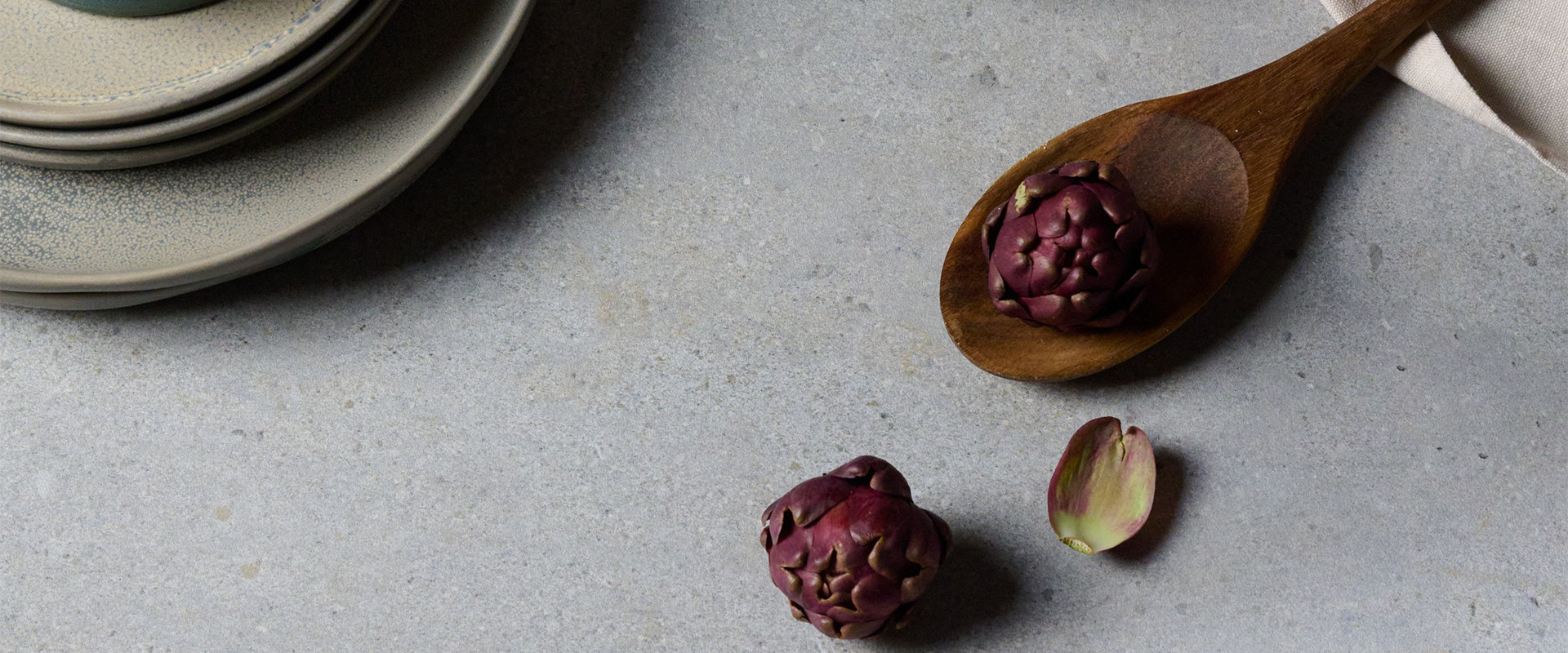
When choosing a kitchen countertop material, the two most popular and versatile options are porcelain stoneware and laminate.
They both offer customizable features and varying levels of performance, so interior designers and planners have a crucial decision to make.
Let’s analyze and compare the features, advantages and disadvantages of these two materials.
A laminate countertop is made of a water-repellent fiberboard panel consisting of several layers of paper that is impregnated with thermosetting resins so that it is fireproof. It is very durable and offers many different color options.
Porcelain stoneware is made from a mixture of clays and minerals that are pressed and fired to produce a resistant and durable material. It is available in a wide range of finishes to complement any furnishing style.
Aesthetically speaking, both options include a selection of different colors and finishes, including variations that accurately reproduce natural materials such as marble, wood, stone, and concrete.
While laminate can be printed with a variety of highly realistic effects, porcelain stoneware is processed through layering, making it possible to obtain several designs inspired by materials to offer a wide range of textures.
Laminate and porcelain stoneware are both very easy to install and maintain; however, laminate tends to absorb water. Porcelain stoneware, instead, is a nonporous material, so it does not deteriorate even after prolonged contact with liquids.
When comparing performance, there are three key features to consider:
In general, laminate countertops are more susceptible to wear and scratches than porcelain stoneware.
Laminate surfaces can deteriorate with time, in particular if they are exposed to intensive use or if they come into contact with sharp or abrasive objects.
As a type of ceramic material, porcelain stoneware countertops are resistant to wear and scratches; these qualities ensure that the surface will remain intact and retain its original appearance even after several years of intensive use, which makes them ideal for very busy kitchens.
Laminate has the defect of being susceptible to heat damage and stains. A number of substances and pigments contained in certain foods or liquids can permanently stain laminate surfaces.
On the other hand, porcelain stoneware countertops are extremely resistant to thermal shock and stains.
In fact, you can safely place hot pots and pans or kitchen utensils on the surface, without risk of damage. Since porcelain stoneware is waterproof, it is also less likely to be stained by food or beverages.
Laminate is often made from synthetic materials, including resins and melamine-impregnated paper, and may contain traces of formaldehyde, which is a toxic substance.
While some types of laminate can also be made from recycled materials, their manufacture has a substantial environmental impact.
Porcelain stoneware is a natural, eco-friendly material derived from clays and mineral colors.
It is more sustainable to produce than laminate, and since porcelain stoneware is long-lasting and durable, it does not need to be frequently replaced, resulting in a lower environmental impact.
The main reason for using laminate is that it is budget-friendly; however, this comes at the expense of performance and durability.
If you are looking for a sustainable kitchen top that offers an outstanding level of performance, strength, durability and a realistic look, porcelain stoneware is the best choice you can make.
When it comes to interior design projects for kitchen furniture, porcelain stoneware sets itself apart with its blend of aesthetics, technical performance, and sustainability. These qualities make it the ultimate material for future kitchen countertops, since it is ideal for creating high-quality spaces intended for intensive use.
With their full-body composition, SapienStone porcelain stoneware countertops are set to revolutionize designer surfaces, since they combine style and technology to be able to adapt to a cosmopolitan lifestyle and sophisticated contemporary trends.
Thanks to innovative 4D Ceramics technology, these surfaces offer unprecedented aesthetic possibilities for the furniture and interior design sectors.
Are you still not sure about what material to choose for your kitchen countertop? Download our catalogs.
Are you looking for a porcelain stoneware kitchen countertop that combines outstanding performance in terms of strength and durability with realistic textured effects? Contact us